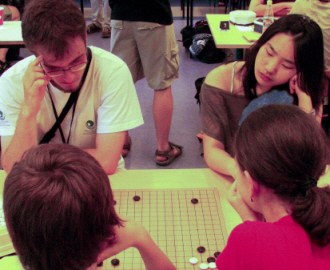2010 European Go Congress II - Hajin Lee 3P

Pair Go
When I explain Go to other people I often start with "Two players place black and white stones alternately on a wooden board¡|¡|" Yet, what about Pair Go? Though it has not been regarded proper form of the game of Go, it seems things are gradually changing thanks to the active promotion of World Pair Go Association. As a result, Korea, China and Japan all have professional Pair-Go tournaments and both US and European Go Congress regularly held Pair-Go competition as one of the main events. Also, I personally have a special relationship with Pair-Go. At the first Pair-Go competition I participated back in 2001 our team took the first place even though I was an unknown player at the time. (My partner was a strong amateur player who was in his 40's.) We went to Japan to play at the International Pair-Go Championship as a Korean representative and took the second place followed after Chinese team. Then in 2008, I played Pair-Go again at the 1st World Mind Sports Games in Beijing. I was supposed to play in a team division, but one player didn't want to play Pair-Go and I changed position with her. We took a bronze medal at the time. Lastly in 2009 US Go Congress, I played with one of my friends who was American 5 dan, and took the first place.
In Korea there is a saying "A wife and a husband have one mind and one body." Well, this sounds ideal not only for matrimony, but Pair Go. You know, one thing Go doesn't require is collaboration. No matter how good or old you are, you get to decide everything by yourself from the beginning to the end. This is good for fostering the sense of independence and responsibility but one may not learn how to deal with teamwork. In that aspect, Pair Go may be the perfect substitution. The stronger player gets to try not to confuse the partner as well as to lead the game. For the weaker player, he/she should know when to give a chance to his/her partner by using a ko threat. Doing-well-alone definitely doesn't work in Pair-Go.
Last year in the US Go Congress I had a friend with whom I wanted to play with from the first place. So I never had to think about how to choose a partner. This year, on the other hand, I wasn't sure whether I would play Pair-Go or not. Then when I noticed everyone else from Korea found partners I felt some kind of jealous. Just as I was thinking that I should find a partner as well, one guy asked me if I had a partner for Pair Go already. My partner, ¡®T' was from Czech Republic, whom I met when I went to Prague back in May. Because of the average-level-cap of 5.5 dan, I could play with 3 dan player at most, but I didn't really care since I thought handicap would compensate the gap anyway. T was 5 kyu player, and I said ¡®Yes' to him for that reason. However, within 30 minutes I found out that there is no handicap up or down to 4 levels range. Then I realized that it was better to be the maximum level, but it was too late already.
Long story short, we got lucky twice and took the third place. Although I thought of visiting a psychiatrist at some point, I could manage to stay cool at last. Because I played with either a stronger player or a player I like I never had the stress issue in playing Pair-Go before. So I think it was a good life experience for me. 
Simultaneous Game
I don't know if it was just feeling or coincidence, European players seemed stronger than the same rank of American players. Do you think it's harder to be promoted in Europe than America? Anyway, I played with 6 players and it took me about 2 and a half hours. Though I had quite hard time, only a good looking boy from Czechia beat me with 8 handicap stones, and others played very well but couldn't manage to win. Oh, I wanted to ask you something. When I first went to Europe, I was told to win as many games as I can in simul games because European players tend to respect more when they lose. On the other hand, in Korea, I was often told not to win too many games especially when I played a special teaching game with an important guest. Do you think it's something from cultural difference?
http://www.starbaduk.com/diary/23038
New update
